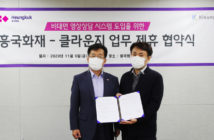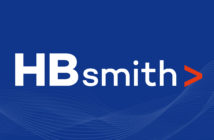While business cards may seem outdated to some, they are still a must-have for anyone who networks a lot. After an event or large meeting, it’s not uncommon to come home with a pocket full of cards which often get thrown on a desk or in a drawer. Rather than rummaging through all your stuff trying to find that one CEO’s email address, business card app Remember keeps your new contacts organized by scanning cards directly into your phone.
While scanning business cards into your smartphone is nothing new, Remember has hit it off in the local market since it launched at the beginning of 2014. Developed by startup Drama and Company, the app now has over 1.5 million registered users in Korea, who have together saved over 70 million cards through the app.
Information on business cards in Korean, English and Chinese (traditional and simplified) is entered into the app by simply taking a photo, including websites and location. Additional information can be added to contacts such as a photo and notes.

The app keeps saved contacts separate from your main phone address book, which I personally prefer, as I’m not likely to be calling all 10 people I met at the latest startup conference anytime soon. I like to think of Remember as a modern rolodex (one of these for young readers), except that finding people is a lot easier.
What’s more, is that if any of your contacts are Remember users, their information will sync automatically — so you can know when someone has changed jobs or been promoted. Teams can also share business cards together, making it ideal for companies needing to contact a large number of suppliers or clients.
Manual transcription over OCR
The main thing that sets Remember apart from other card-scanning apps though, is its manual transcription technology that is much more accurate than commonly used OCR (optical character recognition) methods. While this means that card information isn’t saved instantly, cards in Korean are registered within 15 minutes — and in some cases, less than a minute. English and Chinese cards take longer, but are usually registered with an hour or so.
CEO of Drama and Company Jaeho Choi began the company in 2013 and originally wanted to create a Linkedin-style service for the Asia region.
“We saw that many users weren’t happy with other card scanning services that used OCR,” says Choi. “We wanted to improve on this by providing more accurate card entries, and launched Remember which manages card information through manual transcription.”

Most recently, the company added a new messenger service which connects the platform’s users to each other. Linkedin is known to some Korean users, but Remember’s localized and familiar interface could introduce a new method of communication for business acquaintances — especially for those who prefer to keep their KakaoTalk account for personal use.
“Remember’s service is unchallenged in the local market, which means we’re able to actively provide new features that work well in this context such as the messenger feature.”
Remember was selected as App of the Year by Google Play two years in a row, and looking ahead, Choi says that he will focus on continuing to build Remember into a social networking service for businesses. Drama and Company has attracted a total of 9.5 million won in total funding so far, including a 6.5 million Series B round in 2015.






